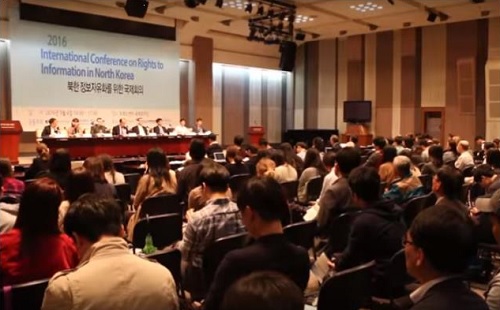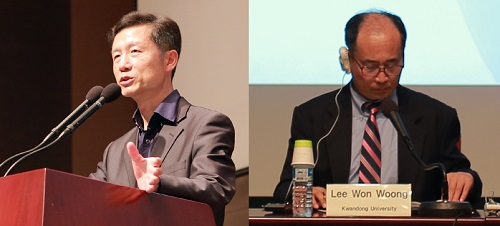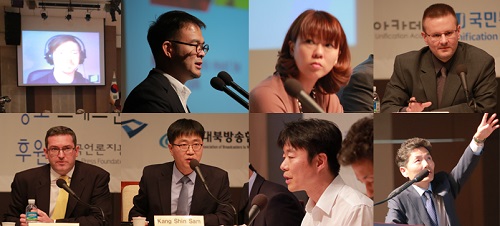ICNK Co-hosted International Conference on Rights to Information in North Korea

On May 4th at 2pm, ЁЎInternational Conference on Rights to Information in North KoreaЁЏ was held in the international conference room of Korean Press Center.
ICNK, Unification Media Group and Association of Broadcasting to North Korea co-hosted this conference to discuss following topics:
1) The analysis of North Korean regimeЁЏs technical approaches to control the free circulation of information and the solutions for this problem
2) Briefing on the current state of affairs on North Korean regimeЁЏs suppression of information
3) International cases demonstrating how the inflow of information led to the improvement of human rights and to the blossoming of democracy
4) Concerning mainly on radio broadcasting, the current state of affairs and limitations regarding the aiding of the better inflow of information in North Korea

Kim Young Hwan, a senior researcher of NKnet, said in the keynote speech that ЁАA fundamental solution to current North Korean problems is the elevation of North KoreaЁЏs democracy standards, which would hasten the end of North Korean peopleЁЏs sufferingЁБ and for this, the improvement of North Korean peopleЁЏs consciousness of democracy is necessary. Kim further argued that for this goal, the inflow of objective information that helps North Korean people make wise choice and judgments is integral.
Professor Lee Won Woong of Catholic Kwandong University was the moderator of the conference. At the conference, it was testified that ЁЎRed Star 3.0ЁЏ-the computer OS that the regime claims as their own independent work-monitors every aspects of North KoreansЁЏ lives. Florian Grunow, a senior researcher of ERNW, a German IT-security company, gave presentation on his analysis of North Korean current state of affairs. He said, ЁАNorth Korean regime continuously monitors its internal intra network so that it can monitor its citizens. ЁЎRed Star 3.0ЁЏ is a computer OS that was created to serve this purpose.ЁБ
He further said, ЁАEvery file that goes through computers installed with Red Star gets tagged by what is called ЁЎwatermarkЁЏ, which is traceable. Therefore, North Korean regime can trace who firstly distributed certain files and who used them afterwards.ЁБ

In subsequent presentations and debates, Arnold Fang, a researcher for East Asia in Amnesty International, and Jenny Town, an assistant director of the US-Korea Institute at the Johns Hopkins School of Advanced International Studies, explained how North Korean regime controls North Korean citizensЁЏ information inflow and infringes upon their right to information. Nicolai Sprekels, the director of SARAM, a German North Korean human rights group, analyzed North KoreaЁЏs current system of information suppression by comparing with NaziЁЏs counterpart during the WWII.
Benedict Rogers, East Asian team leader at Christian Solidarity Worldwide, gave presentation on how the freedom of information influences the freedom of religion, based on his own experiences in Burma and Indonesia. He mentioned a case of an Indonesian youth Alex An, who was imprisoned for 2 years because of his atheism. Alex An confessed that the most difficult thing was the lack of opportunities to access information through such means as books, newspapers, or magazines. Based on this experience, Benedict Rogers emphasized that the freedom of information is essential for the freedom of religion and the freedom of __EXPRESSION__.
In following debates, Kang Shin Sam, the chairman of Association of Broadcasting to North Korea was notable for his presentation of real cases in such North Korea-China border cities as Dandong and Guantian and of his own projects in China on the aiding of information inflow in North Korea.

Lee Kwang Baek, the director of Unification Media Group, expressed his view on the aiding of information inflow in North Korea by the means of ongoing radio broadcasts to North Korea. He said, ЁАSending out radio broadcasts with stronger frequency and the provision of USB, CD, Radio or other machines will not only quench North Korean citizensЁЏ thirst for information but also foster the revolution of consciousness amongst North Koreans.ЁБ
Park Se Kyung, the head director of Northeast Asian Broadcasting Institute, proposed in the debate that ЁАBy constantly changing frequencies, North Korean citizens have struggled for past 10 or more so years to listen to foreign radio broadcasts. Now, we should introduce shortwave frequency as well as medium wave to present broadcasts with better sound quality.ЁБ
